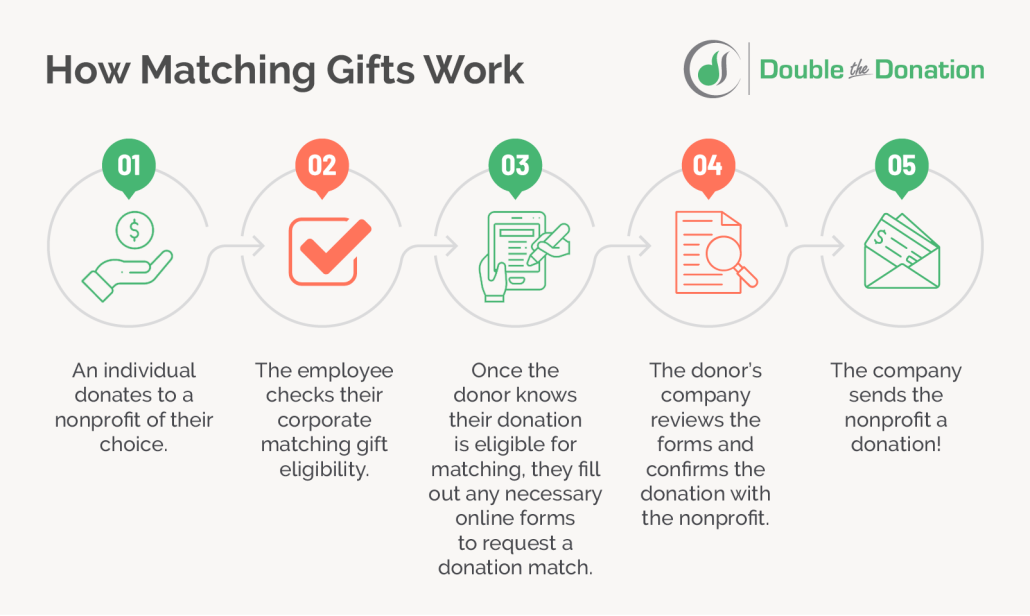The ultimate guide to corporate philanthropy for nonprofits
Wiki Article
Checking Out How Company Philanthropy Shapes Brand Name Track Record and Customer Commitment
Corporate philanthropy considerably affects brand online reputation and consumer commitment. Companies that involve in authentic philanthropic initiatives usually see a favorable change in how customers perceive them. This placement of worths promotes count on and emotional links with audiences. Nevertheless, the performance of these humanitarian efforts can differ significantly. Understanding what genuinely resonates with customers is vital for brands seeking to enhance their social influence and market placement. What techniques will become crucial for future success?The Evolution of Corporate Philanthropy
As services increasingly identify their duty in society, the development of business philanthropy has changed from mere philanthropic contributions to a tactical element of brand identification. Companies involved in philanthropy mostly for tax obligation advantages or to boost their public image. With time, this method moved as stakeholders-- including clients, capitalists, and staff members-- demanded an extra authentic dedication to social responsibility.Organizations began straightening their humanitarian campaigns with their core values and business goals, bring about more impactful and thoughtful payments. This adjustment has urged companies to invest in lasting techniques and community advancement, fostering a sense of objective that resonates with consumers.
Additionally, technical improvements have helped with transparency and engagement, enabling companies to display their humanitarian initiatives extra efficiently. Consequently, company philanthropy has actually become an indispensable part of organization strategy, with companies embracing the chance to favorably influence culture while boosting their general brand narrative.
The Effect of Philanthropy on Brand Name Assumption
While business participate in philanthropic efforts to advertise social great, these initiatives considerably shape brand name understanding among customers. Company philanthropy can boost a brand name's image by associating it with favorable social impact and area involvement. Consumers frequently regard brands that actively take part in philanthropic activities as more trustworthy and liable. This assumption can affect acquiring choices, as consumers might favor brands that show a dedication to social issues.
Building Emotional Links With Offering
Corporate philanthropy offers as an effective device for improving brand name identification by connecting company worths with neighborhood needs. With critical providing, companies can cultivate community interaction and create shared values that reverberate with customers on an emotional degree. This strategy not just enhances brand name credibility but also constructs enduring connections in between organizations and their stakeholders.Enhancing Brand Name Identification
When firms take part in philanthropic efforts, they not just add to societal excellent however also forge much deeper emotional connections with their target markets. By straightening their brand name with charitable causes, companies improve their identity and signal values that reverberate with customers. This positioning develops a narrative that exceeds product or services, welcoming clients to take part in a shared objective. As customers increasingly prioritize purpose-driven brand names, business that actively take part in giving can distinguish themselves in a crowded market. Such campaigns cultivate a feeling of commitment among customers that really feel personally connected to the brand's worths. Inevitably, business philanthropy comes to be a crucial device for improving brand identification, cultivating long lasting connections based on shared ideas and emotional engagement.Fostering Community Engagement
Numerous studies suggest that firms engaging in community-focused philanthropic campaigns can significantly strengthen emotional links with their stakeholders. By investing in local projects and sustaining social causes, organizations cultivate a sense of belonging and count on within the community. This involvement promotes a favorable brand picture, as customers appreciate firms that show genuine issue for societal problems. In addition, workers typically really feel a lot more proud and determined to be connected with an organization that focuses on neighborhood well-being. Therefore, consumers are most likely to develop commitment in the direction of brand names that proactively add to purposeful reasons. Eventually, cultivating community involvement through philanthropy not only boosts brand name online reputation but additionally constructs long-term psychological connections that benefit both the company and the area it offers.Creating Shared Worths
Just how can services efficiently create common values that reverberate with their stakeholders? Companies can accomplish this by straightening their humanitarian initiatives with their core objective and the passions of their neighborhoods. By taking part in campaigns that deal with regional requirements, companies foster emotional links with consumers, improving brand name loyalty. For example, partnering with non-profits that mirror shared values enhances the brand's photo and demonstrates dedication to social duty. Furthermore, clear interaction concerning these initiatives allows stakeholders to see the concrete influence of their contributions. Inevitably, by incorporating common values right into their company philanthropy, business not only improve their credibilities however likewise cultivate long-term partnerships with clients, leading to raised loyalty and count on. This positioning is crucial in contemporary customer decision-making.Case Studies: Successful Philanthropic Campaigns
Checking out effective kind projects discloses numerous strategies why not try these out that improve brand track record. Impactful neighborhood campaigns, cutting-edge partnership designs, and long-lasting interaction techniques have actually verified efficient in promoting positive links with consumers. These situation studies highlight the importance of thoughtful business giving up achieving both social and organization goals.Impactful Community Initiatives
Several firms have successfully leveraged humanitarian projects to improve their brand credibility while making a significant impact in their neighborhoods. A modern technology company released a digital literacy program in underserved neighborhoods, supplying training and resources that empowered regional citizens. This campaign not just added to community growth but additionally positioned the business as a socially accountable leader. A significant food firm executed a hunger alleviation project, partnering with regional nonprofits to distribute dishes to households in need. This initiative strengthened area ties and fostered customer loyalty. With these impactful campaigns, business have actually demonstrated their commitment to social responsibility, properly aligning their brand name worths with the requirements of the neighborhoods they offer, eventually improving their general reputation.Innovative Partnership Designs
The success of impactful community initiatives typically rests on ingenious partnership models that bring together diverse stakeholders to deal with facility social obstacles. Instance research studies show exactly how companies, non-profits, and government entities can team up effectively. For circumstances, an international firm partnered with a regional non-profit to launch an education and learning program, pooling resources and expertise to improve neighborhood literacy prices. One more example entailed a tech company and a medical care company joining pressures to establish a telemedicine service for underserved populaces. These collaborations not only intensified the reach of humanitarian efforts yet likewise reinforced the brand names' online reputations by aligning their missions with neighborhood needs. Inevitably, ingenious collaboration designs function as a driver for meaningful modification and foster stronger connections in between brands and their customers.Long-term Involvement Techniques

Determining the ROI of Corporate Social Obligation
As companies significantly buy company social responsibility (CSR) campaigns, comprehending the return on financial investment (ROI) connected with these initiatives ends up being important. Gauging ROI in CSR is multifaceted, usually including both measurable and qualitative metrics. see this Monetary returns can be assessed with increased sales, improved brand name commitment, and improved worker spirits, which can result in greater productivity. Furthermore, firms may examine price savings linked to lasting practices, such as decreased waste or power intake.Qualitatively, the impact of CSR on brand online reputation can be evaluated through consumer assumption researches and social networks belief analysis. Studies can provide understandings right into exactly how CSR tasks influence client commitment and depend on. Benchmarking versus sector criteria can assist organizations assess their CSR performance - corporate philanthropy. Eventually, a complete technique to gauging ROI enables companies to make enlightened decisions regarding future CSR financial investments, lining up approaches with both economic performance and social impact
Customer Expectations and Company Obligation
Increasingly, consumers anticipate business to operate with a strong sense of corporate obligation, watching ethical techniques as a requirement for brand name loyalty. This shift in assumption reflects a growing recognition of social and environmental problems, leading clients to prefer brands that line up with their values. Customers are more likely to sustain firms that involve in transparent methods, demonstrate sustainability, and contribute positively to their areas.Moreover, social networks intensifies these assumptions, permitting consumers to share their viewpoints and experiences quickly. Brands that fail to fulfill these honest criteria run the risk of backlash, while those that accept business duty usually appreciate improved credibility and consumer commitment. As customers demand accountability, firms have to incorporate corporate social obligation into their core strategies, focusing on moral habits not simply as a marketing strategy, however as a basic aspect of their procedures. This alignment can inevitably lead to more powerful brand affinity and sustained success in affordable markets.
Future Patterns in Corporate Philanthropy and Brand Commitment
The landscape of business philanthropy is evolving, influenced by the heightened consumer assumptions surrounding corporate obligation. Business are significantly incorporating social influence into their core organization strategies, not simply as an ancillary activity. Future fads show a change towards transparency, with brands sharing in-depth info concerning their philanthropic campaigns and their straight effects on neighborhoods.Innovation is playing an important duty, making it possible for real-time involvement between brand names and consumers. Social media platforms facilitate straight communication, permitting consumers to voice their assumptions and hold brand names answerable. In addition, more youthful generations, particularly Millennials and Gen Z, focus on sustainability and ethical practices, driving companies to take on even more diligent approaches.
As company philanthropy ends up being identified with brand name identification, firms that authentically align their goals with social needs are likely to cultivate stronger client commitment. This merging of worths will ultimately shape the future of corporate reputation and customer connections in an increasingly diligent market.
Often Asked Concerns
How Do Consumers Discover a Company's Philanthropic Initiatives?
Customers discover a company's humanitarian initiatives via various networks, including social networks, press launches, community events, and word-of-mouth. These opportunities help with recognition, making it possible for people to engage with brands that line up with their interests and worths.What Role Does Worker Participation Play in Corporate Philanthropy?
Staff member involvement in corporate philanthropy improves engagement, fosters a sense of possession, and enhances group cohesion - corporate philanthropy. This participation usually intensifies the effect of philanthropic efforts, causing greater awareness and assistance for the firm's philanthropic initiativesCan Corporate Philanthropy Backfire on a Brand name's Reputation?
If viewed as opportunistic or insincere, business philanthropy can indeed backfire on a brand's track record. Unfavorable public assumption may emerge, leading to decreased trust fund and commitment amongst consumers that prioritize credibility in company activities.Are Smaller Sized Business as Effective in Philanthropy as Larger Companies?
Smaller sized companies can be equally effective in philanthropy as larger corporations, usually showing dexterity and authenticity. Their localized efforts might resonate much more deeply with areas, cultivating real links in spite of limited resources compared to their bigger counterparts.Just How Can Firms Pick the Right Creates to Assistance?
Companies can pick the best reasons by straightening their worths with community needs, examining stakeholder rate of interests, and examining possible influence. This tactical technique fosters authenticity, enhances involvement, and reinforces connections with customers and the more comprehensive area.While business engage in philanthropic efforts to advertise social excellent, these efforts substantially shape brand name perception among consumers. As consumers progressively focus on purpose-driven brands, companies that proactively involve in providing can separate themselves in a jampacked market. Numerous business have effectively leveraged humanitarian projects to enhance their brand name online reputation while making a meaningful influence in their neighborhoods. Progressively, consumers anticipate companies to run with a strong feeling of company duty, watching ethical techniques as a prerequisite for official source brand name commitment. As corporate philanthropy comes to be identified with brand identification, companies that authentically straighten their goals with societal demands are likely to foster stronger client commitment.
Report this wiki page